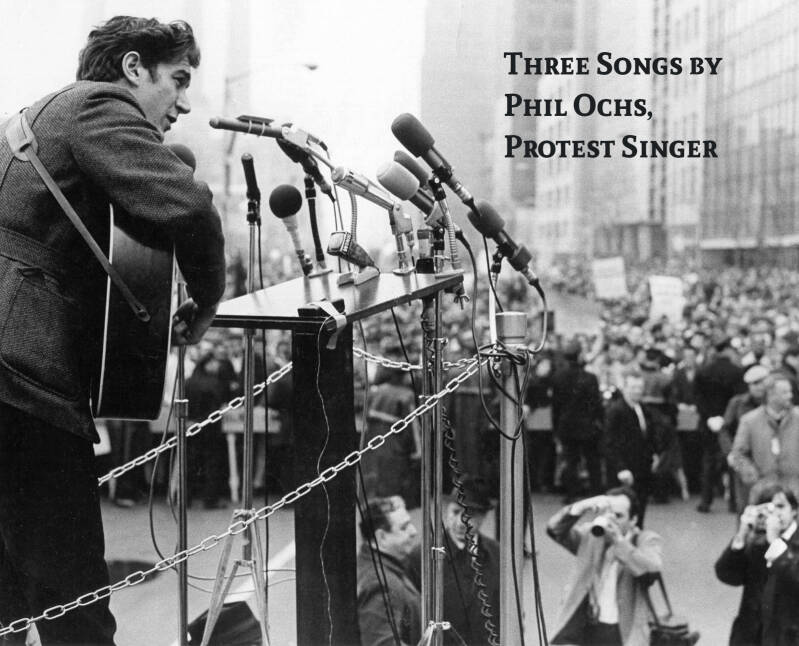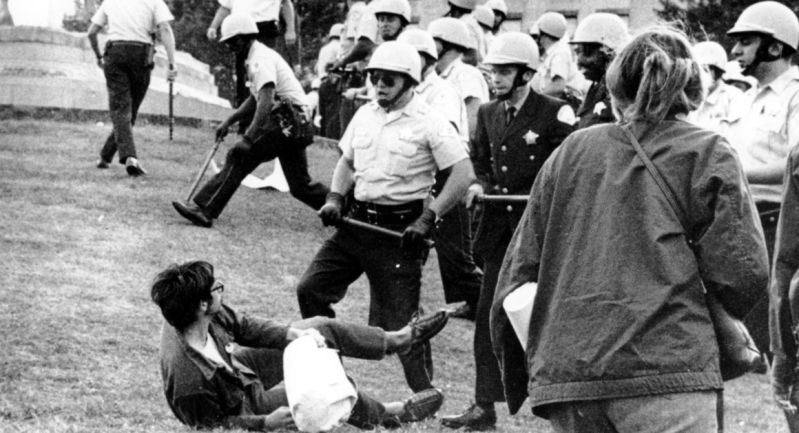
“I just can’t keep up with Phil. And he’s gettin’ better and better.”
— Bob Dylan
1
Phil Ochs took his own life in April 1976. A belief that his music had become irrelevant had stung Ochs. Allied to this he suffered a mugging in Dar es Salaam in 1973, his assailants choking him so badly they permanently injured his larynx. He now believed this assault, which robbed him of his upper register, had ruined his voice. The gloom surrounding him made him think no one was listening anymore.

2
As a child Phil Ochs gave school the swerve, heading for the cinema. Rebel Without a Cause was a favourite — he believed he could be a rebel like James Dean. Later he referenced Robin Hood and Jesse James in his songs. Prior to landing in Greenwich Village in the early 1960s Ochs studied Journalism at Ohio State University. That his studies influenced his lyrical style is undeniable. Howard Brinkman argued that his first album, All the News That’s Fit to Sing, released in 1964, established him as a singing journalist. Ochs seemed to concur: “Every newspaper headline is a potential song.”

A broadcasting ban that prevented him from appearing on American radio and television proved the virus of McCarthyism remained. Despite this censorship his records made the national charts. Phil Ochs had an audience. On his 1969 album, Rehearsals for Retirement, the song Another Age didn’t mess around:
“So I pledge allegiance against the flag
And the flaw for which it stands
I'll raise it if I can.”
Some headbangers in America would consider this as truly seditious. Phil Ochs was the protest singer.

3
“Meet the king of cowboys, he rides a pale pony
He fights the bad boys brings them to their knees
He patrols the highways from the air
He keeps the country safe from long hair
I am the masculine American man
I kill therefore I am.
“I don't like the black man, for he doesn't know his place
Take the back of my hand or I'll spray you with my mace
I'm as brave as any man can be
I find my courage through chemistry
I am the masculine American man
I kill therefore I am.”
If Woody Guthrie’s guitar killed fascists, Ochs too used his for social revolution in the country he loved. Of all Ochs’ songs, is there another with as much relevance today as I Kill Therefore I Am?

“Songs have changed political situations . . . that great song, We Shall Overcome, you know when that came out it just spread around the English speaking world like wildfire, and it stood for lots of meanings, you know, people holding demonstrations, completely different from each other. You can’t overestimate the power of a song, can you?”
— The singer Luke Cheevers speaking to Donal Dineen on the web series This Ain’t No Disco.
4
Ochs appeared at the Festival of Life demonstration against the Vietnam War in Grant Park, Chicago, in 1968, an event which he had helped to organise, and also coincided with the Democratic National Convention. During the performance of his most vehement anti-war song, I Ain’t Marching Anymore, flames sparked among the crowd as young men, inspired by Ochs’ message, burned their draft cards.
“For I've killed my share of Indians
In a thousand different fights
I was there at the Little Big Horn
I heard many men lying
I saw many more dying
But I ain't marchin' anymore.
“It's always the old to lead us to the war
It's always the young to fall
Now look at all we've won with the saber and the gun
Tell me is it worth it all
For I stole California from the Mexican land
Fought in the bloody Civil War
Yes I even killed my brother
And so many others.”
Hubert Humphry won the nomination at the convention at the expense of anti-war candidates. Nixon became president. Ochs took it hard. Both candidates were pro-war. Not for the first time, Ochs questioned the legitimacy of the election in Another Age: “If that was an election, I'm a Viet Cong.” Something died in Ochs after that convention, as the tombstone on the cover for Rehearsals for Retirement made clear. For Ochs, the revolution was over.


“And if there's any hope for America, it lies in a revolution, and if there's any hope for a revolution in America, it lies in getting Elvis Presley to become Che Guevara.”
5
The 1970s saw the music of solo artists become apolitical whereas Ochs’ remained steadfastly rooted in social change and revolution. If no one was listening, did the rebel still have a cause? His final record, Phil Ochs’ Greatest Hits, produced in part by Van Dyke Parks, who described him as intense during recording, was ironically a collection of entirely new songs. The final cut: No More Songs.
His performances became sporadic, but in support of his final album he rolled into Carnegie Hall for two shows. Most of the sets featured medleys of Elvis Presley and Buddy Holly songs in favour of his protest numbers. The audience booed. Someone shouted, ‘“Bring back Phil Ochs.” A live recording, brilliantly titled, Gunfight at Carnegie Hall, appeared in 1974. Ochs left the stage. Shortly before his death he said to his brother, “Do you think the songs will be remembered?” I wish we could tell him: “Yes, Phil, they’re more relevant than ever.” Speaking to the journalist Paul Krassner as he came off stage at the Festival of Life, Ochs said: “This is the highlight of my career.” But his legacy is so much greater than this one moment, as extraordinary as it was. Just listen to I Kill Therefore I Am: America could use Phil Ochs right now.
Create Your Own Website With Webador